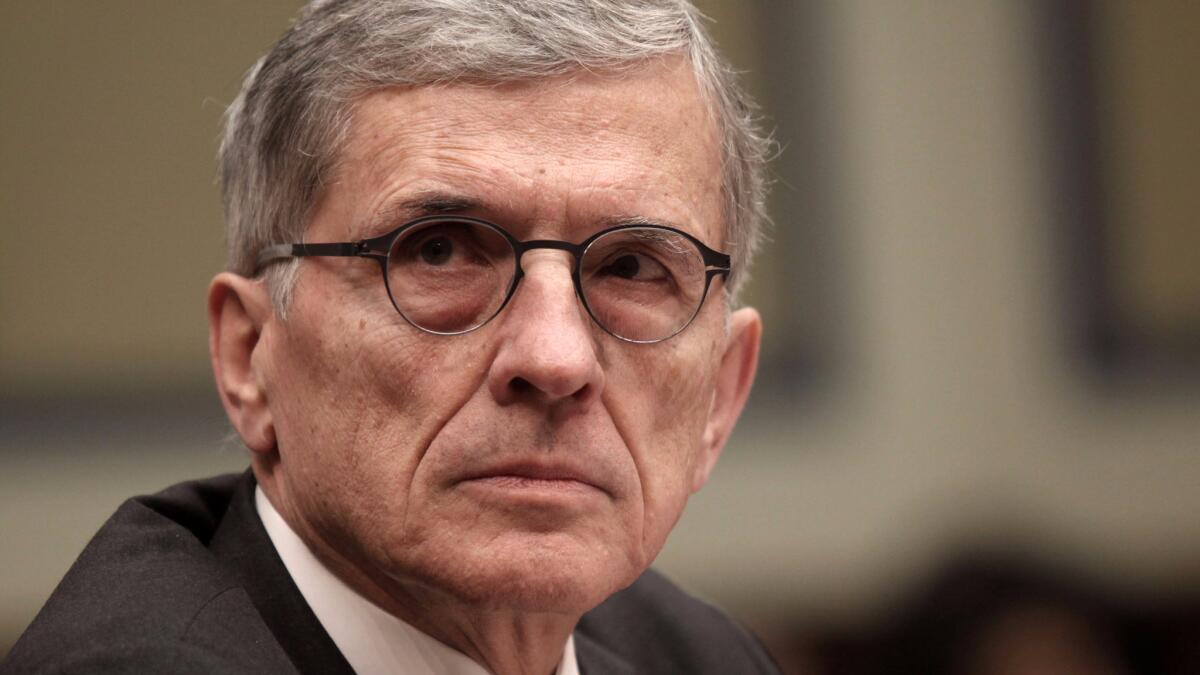Your Internet privacy shouldn’t be a ‘luxury item,’ FCC chief says

- Share via
Should your online privacy depend on whether you’ve paid your Internet provider a little extra this month?
That’s one of the key policy questions concerning the future of the Web. And this week, the nation’s top telecom and broadband regulator, Tom Wheeler, signaled that he’s not a fan of the idea.
Talking to reporters, the head of the Federal Communications Commission implied that the Internet risks becoming divided into privacy haves and have-nots, if companies such as AT&T and Comcast can dangle discounts in front of customers in exchange for slurping up their search and browsing histories for advertising purposes.
“I would hope that privacy doesn’t become a luxury item,” Wheeler said.
The FCC is waist-deep in crafting a set of privacy regulations for Internet service providers, or ISPs. Some, such as Comcast, have met with the agency to ask that it not restrict ISPs’ ability to tinker with a discount-for-data business model.
“A bargained-for exchange of information for service is a perfectly acceptable and widely used model throughout the U.S. economy, including the Internet ecosystem,” Comcast said in a regulatory filing this week.
From one perspective, a broadband discount could help get people online who otherwise couldn’t afford it. Cable companies such as Comcast argue that they shouldn’t be treated any differently from other Internet firms: Google, for example, offers many of its services free of charge in exchange for users’ personal data. So does Facebook, as well as many online news outlets.
But this business model would put ISPs in direct competition with websites for advertising dollars. And the service providers’ ability to see the whole breadth of a user’s online activity — not just what they search for during the day or which videos they watch on Netflix — could give the ISPs a big advantage over Web companies, critics say.
What’s more, opponents argue, the plans could exacerbate inequality. By making it more expensive to buy Internet plans that don’t mine users’ personal information, wealthier Americans may be able to avoid the tracking while lower-income Americans must face a growing barrage of ads, offers and promotions — some of which may not be in their best interest.
“Low-income consumers have less disposable income with which to pay for privacy-protective plans, and therefore are much more likely to give up their privacy in exchange for access to the Internet,” wrote Eric Null, a policy lawyer at the New America Foundation’s Open Technology Institute. “Low-income consumers should not have to decide between Internet access and privacy, but pay-for-privacy forces that decision upon them.”
Fung writes for the Washington Post.
ALSO
New rules aim to protect widowed homeowners from foreclosure
Blaze Pizza quickly grew to 150 stores. Now it wants to serve the nation
Column: Phone companies could stop robocalls. They’re just not doing it






